The Human Rights Watch organization has called on the Pakistani government to immediately transfer civilians who are set to be tried in military courts to the civilian justice system. Trying civilians in military courts violates Pakistan’s obligations under international human rights laws that guarantee due process and fair trial rights for criminal suspects. The Pakistan police have transferred 33 civilian suspects accused of attacking critical defense installations, damaging or stealing important government equipment, computers, and other means of data collection to the army for trial in military courts. However, according to international human rights standards, there is no basis for Pakistani authorities to try such cases in military courts, especially as the civilian courts are functioning.
Importance of Upholding Fair Trial Rights in Pakistan
In light of the recent clashes that took place across Pakistan after the arrest of former Prime Minister Imran Khan, violence broke out, and many of Khan’s supporters attacked police officers and public property. As a result, the Pakistani government has arrested thousands of members of Khan’s political party, Tehrik-i-Insaaf, on charges of criminal intimidation, rioting, and assault on government officials. Still, many have been charged under vague and overbroad laws prohibiting rioting and creating threats to public order. However, all those arrested merely for their political affiliation should be released immediately, and all their charges dropped. If Pakistan tries civilians in military courts, it may raise serious credibility concerns in the equitable, impartial, and independent administration of justice, which may lead to grave consequences such as unrest and violence.
International Human Rights Standards vs. Military Courts
Article 14 of the International Covenant on Civil and Political Rights (ICCPR) guarantees everyone the right to a trial by a competent, independent, and impartial tribunal. The Human Rights Committee, the international expert body authorized to monitor compliance with the ICCPR, has stated that the trial of civilians in military or special courts may raise serious problems in terms of the equitable, impartial, and independent administration of justice. Besides, it states that the trials of civilians by military or special courts should be material and limited to cases where the State party can show that resorting to such trials is necessary and justified by objective and serious reasons, and where regular civilian courts are unable to undertake the trials. Therefore, the government should use independent and impartial civilian courts to try these cases—strengthening the civilian courts while upholding the rule of law is an effective response to violence.
Recommendations
Human Rights Watch recommends that the Pakistan government instruct its officers to observe international human rights standards and guarantee fair trial rights while prosecuting violence. The Government should use independent and impartial civilian courts to try these cases, and defendants should have a right of appeal with civilian high courts and the Supreme Court. The government should also drop all charges against civilians arrested merely for their political affiliation and release them immediately. Pakistan should strengthen civilian courts to ensure that they can handle cases such as these independently and impartially, thus upholding the rule of law. Denying people a fair trial is not the answer to Pakistan’s complex security and political challenges, and it may lead to worse consequences than may be envisaged by the Government.

<< photo by Pixabay >>
You might want to read !
- Indigenous Land Rights in Brazil are Under Attack
- Japan’s “Hostage Justice” System: A Violation of Human Rights.
- Political and Humanitarian Crisis Intensifies: Lao Refugee Shot Dead in Thailand
- How Lula’s Failure in Venezuela Affects Human Rights
- Yemen’s humanitarian crisis deepens as Houthis continue forced disappearance of Baha’is
- United Nations extends arms embargo in South Sudan, bringing hope to victims of decade-long conflict.
- The Implications of Uganda’s Anti-LGBT Law for Human Rights in Africa
- Uganda’s Anti-LGBTI Bill Approval: A Dangerous Attack on Human Rights.
- The Perils of Using Video for Pretrial Detention Renewals in Egypt
- “Is the Philippines’ Justice System Under Siege by Politics? Latest de Lima Acquittal Raises Concerns”